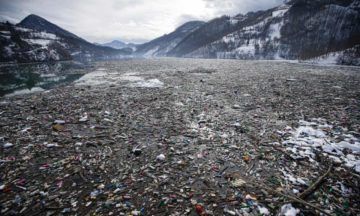Jonathan Watts in The Guardian:
 Elizabeth Kolbert’s favourite movie is the end-of-the-world comedy Dr Strangelove or: How I Learned to Stop Worrying and Love the Bomb. For those who need a quick recap, this cold war film features a deranged US air force general who orders a nuclear attack on the Soviet Union using weapons developed by a mad Nazi scientist played by Peter Sellers. A last-minute glitch almost forestalls an apocalyptic war, but a gung-ho B-52 pilot has other ideas. He opens the bomb doors and mounts the H-bomb as if it were a horse, waving his hat and whooping as he rides the missile towards the world’s oblivion. No heroism could be more misguided. No movie could end with a blunter message: how on Earth can we humans trust ourselves with planet-altering technology?
Elizabeth Kolbert’s favourite movie is the end-of-the-world comedy Dr Strangelove or: How I Learned to Stop Worrying and Love the Bomb. For those who need a quick recap, this cold war film features a deranged US air force general who orders a nuclear attack on the Soviet Union using weapons developed by a mad Nazi scientist played by Peter Sellers. A last-minute glitch almost forestalls an apocalyptic war, but a gung-ho B-52 pilot has other ideas. He opens the bomb doors and mounts the H-bomb as if it were a horse, waving his hat and whooping as he rides the missile towards the world’s oblivion. No heroism could be more misguided. No movie could end with a blunter message: how on Earth can we humans trust ourselves with planet-altering technology?
The same absurdly serious question lies at the heart of Kolbert’s new book, Under a White Sky. The Sixth Extinction, her previous book, won a Pulitzer prize for its investigation into how mankind has devastated the natural world. Now she has widened her gaze to whether we can remedy this with ingenious technological fixes – or make things worse. “There was definitely a question left hanging: now we have become such a dominant force on planet Earth, and created so many problems through our intervention, what happens next?”, she says.
In Under a White Sky she examines cutting-edge scientific advances: how much hope can we place in gene-modification, geoengineering and assisted evolution? To what extent can we repair the mess we have made? Thanks to humans, the planet is heating dangerously fast, there is now more carbon dioxide in the atmosphere than at any time in millions of years, the extinction rate of other species is hundreds, maybe thousands, of times above natural levels, and just about every planetary warning gauge is heading further into the red. Are there mega-solutions out there for these mega-problems?
More here.
